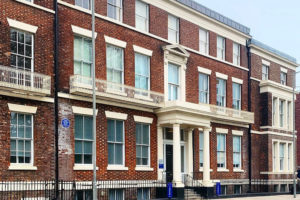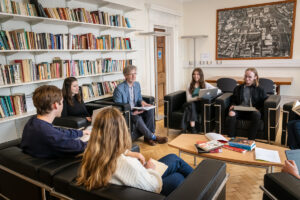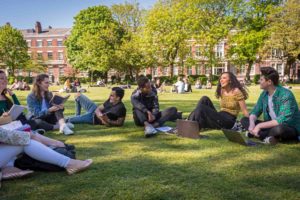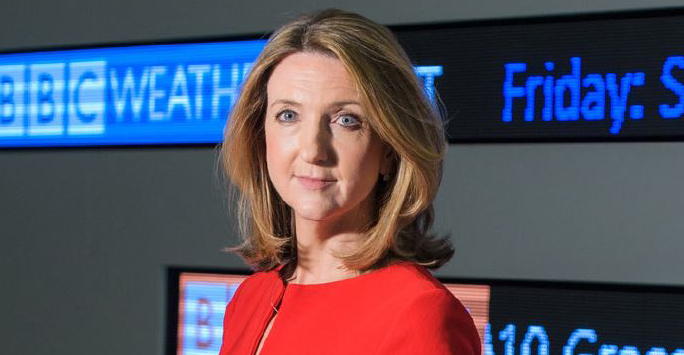Clearing 2025
Clearing places have been filled on this course for 2025 entry.
English Language
UCAS code Q310
- Study mode
- Full-time
- Duration
- 3 years
- Start date and application deadlines
-
- Start date
Clearing places have been filled on this course for 2025 entry.
UCAS code Q310
Our English Language programme aims to develop your understanding of the ways in which language works in the world. You will study the development and uses of the English language in a variety of social, historical, and educational contexts, and gain insights into the ways in which the language we use in everyday life is shaped by factors such as literature, culture and psychology.
Your first year of study focuses on building key skills and knowledge to prepare you for more specialised study. You will explore the history, development and contexts of the English language, and will have the opportunity to apply methods of language analysis to literary texts and other media.
In your second and final years, you will be able to choose specialist modules in topics such as psycholinguistics, language and gender, the history of English, child language acquisition, language and computing, and teaching English to speakers of other languages. The final year also includes an option to write a dissertation on a research project of your own design, or to do a work placement with an organisation relevant to your degree through the SOTA300 module.
This programme is available with an optional year in industry. If this is chosen, year three is spent on a paid placement within an organisation in industry, broadly defined. You will be supported by the School of the Arts and the Department throughout, and your reflexive written account of the experience will contribute towards your final degree result. If you wish to study this programme with a year in industry, please put the option code ‘YI’ in the ‘further choices’ section of your UCAS application form.
We are pleased to offer two attainment scholarships per year to undergraduate students from the UK. The scholarships will cover the entire UK tuition fee for both years two and three (currently £9,250 per annum). Awards will be made by the department at the end of year one, based on performance.

We’re proud to announce we’ve been awarded a Gold rating for educational excellence.
Discover what you'll learn, what you'll study, and how you'll be taught and assessed.
You will take four compulsory modules, and choose two options.
| Compulsory modules | Credits |
|---|---|
| ATTITUDES TO ENGLISH (ENGL106) | 15 |
| ENGLISH LANGUAGE IN CONTEXT (ENGL116) | 30 |
| INTRODUCTION TO LANGUAGE STUDY (ENGL107) | 30 |
| INTRODUCTION TO STYLISTICS (ENGL105) | 15 |
Programme details and modules listed are illustrative only and subject to change.
Your second year is composed entirely of optional modules, which cover the major theoretical, historical and sociocultural approaches to the study of the English language. You will work closely with academic specialists to develop your knowledge of key concepts and your skills of independent study.
Programme details and modules listed are illustrative only and subject to change.
You will choose entirely optional modules, all of which are designed to allow greater specialisation and generic and/or thematic focus. Modules at this level will often reflect the current research of our academic staff and will allow you to explore the applications of language study in contexts such as education and the legal system. These modules will enable you to take part in debates about the current and future directions of the subject, and enable you to develop your skills of independent research. Your options may include a dissertation on a subject of your choosing or a work placement with an organisation relevant to your degree.
Programme details and modules listed are illustrative only and subject to change.
In year one, you will take modules that aim to develop your knowledge of the history and development of the English language and to build the analytical skills needed for advanced study. In years two and three, you will choose from a range of modules that allow you to specialise in key areas of language.
In each year, you will take 60 credits of English and 60 credits from your other subject choice.
You will experience a mix of workshops, seminars and tutorials. Alongside independent study and research, some modules require timetabled student group work. We provide an online programme of study skills to help with the necessary standards of referencing and presentation in written work.
Tutorials last for one hour, and allow for discussion of key readings, concepts and ideas, typically in groups of up to nine students. Seminar groups last for two hours, in groups of up to fourteen. Workshops are delivered to the whole module cohort, and have a more distinct practical element. In addition, in your second and final years, you will participate in a range of other formative activities such as seminar presentations.
In the first and second years, the main modes of assessment are a combination of essay and online examination. In the third year you will encounter assessments designed to prepare you for the world of work, such as reports, evaluations, presentations, and projects. There are no examinations in the third year.
We have a distinctive approach to education, the Liverpool Curriculum Framework, which focuses on research-connected teaching, active learning, and authentic assessment to ensure our students graduate as digitally fluent and confident global citizens.
The Liverpool Curriculum framework sets out our distinctive approach to education. Our teaching staff support our students to develop academic knowledge, skills, and understanding alongside our graduate attributes:
Our curriculum is characterised by the three Liverpool Hallmarks:
All this is underpinned by our core value of inclusivity and commitment to providing a curriculum that is accessible to all students.
The qualifications and exam results you'll need to apply for this course.
| Qualification | Details |
|---|---|
| A levels |
BBC (including English: B) |
| BTEC Level 3 national extended diploma |
DDM and grade B in A level English. |
| BTEC combinations |
BTEC National Diploma DM plus grade B at English A level; BTEC National Extended Certificate M plus grade B in English at A level and grade B in another A level. |
| Welsh Baccalaureate Advanced |
Grade M, plus A level grades BB including grade B in English. |
| Access |
Pass relevant Access to HE Diploma with 45 Level 3 credits with 27 at Distinction and 18 at Merit. Requires level 3 credits at Distinction in English. |
Studying with us means you can tailor your degree to suit you. Here's what is available on this course.
University of Liverpool students can choose from an exciting range of study placements at partner universities worldwide. Choose to spend a year at XJTLU in China or a year or semester at an institution of your choice.
Immerse yourself in Chinese culture on an optional additional year at Xi'an Jiaotong Liverpool University in stunning Suzhou.
Broaden your world by spending an additional year of study at a partner university abroad following your second year of study.
Take a semester of your second year of study at one of our worldwide partner institutions.
Spend a summer abroad on a study placement or research project at one of our worldwide partner institutions.
Year in industry placements give you an in-depth workplace experience where you can develop your skills and apply your learning.
You don't need to decide now - you can choose to add a year in industry after you've begun your degree.
Learn more about year in industry
To spend a year in industry, you'll need to secure a placement with an organisation. If you're unable to find a placement, you'll continue with the standard version of the course without a year in industry.
Every student at The University of Liverpool can study a language as part of, or alongside their degree. You can choose:
With a combined degree, you can study two subjects as part of the same degree programme.
The Department of English is based in the School of the Arts, although teaching will take place across the campus. We are committed to small group teaching, which encourages a more rewarding learning experience, where ideas are shared and explored with your peers and tutors.






What’s it like to Study English at Liverpool? A conversation between Alex Carabine and Dr Natalie Hanna.
From arrival to alumni, we’re with you all the way:

The staff are the best thing about the English department. They’re enthusiastic, encouraging, and incredibly knowledgeable about their fields.

Want to find out more about student life?
Chat with our student ambassadors and ask any questions you have.
A day in the life of English student Scarlett Wager-Leigh.
As a student in the School of the Arts, you will be supported to maximise your employability from day one. Our English degree programmes are valued by employers who recognise the skills our students develop, including teamwork, project design, critical thinking, proficiency in text analysis and communication and presentation skills.
The School has its own Placements and Employability Officer, and you will have the opportunity to undertake a semester-long work placement or a year in industry. We offer a popular poetry publishing placement through the SOTA300 work experience module, and you can read about the experiences of students who have undertaken this placement – and since found employment in the publishing industry – here.
Our graduates leave to take up a very wide range of careers. A number take up jobs in journalism, broadcasting, or advertising; some begin as management trainees in a variety of businesses; others start their careers in retailing, computing, librarianship, the arts or the Civil Service. Many go on to train further as teachers, or as solicitors or accountants; some pursue careers in teaching English as a foreign language.
4 in 5 English students find their main activity after graduation meaningful.
(Graduate Outcomes, 2018-19.)
Hear what graduates say about their career progression and life after university.

The main reason I had an amazing time was that I made some wonderful friends, some I am still very close to now. My course opened my eyes to so many novels and plays and texts that I would never have read otherwise. And that’s one of the points about university.

My advice to students or budding entrepreneurs would be this: work hard on things that interest you; get as much experience and on-the-ground learning as possible; and build a network of mentors around you as early as possible. I truly believe that if you treat everything as a learning experience, anything can happen.
Your tuition fees, funding your studies, and other costs to consider.
Full-time place, per year - £9,535
Year in industry fee - £1,905
Year abroad fee - £1,430 (applies to year in China)
Full-time place, per year - £24,100
Year in industry fee - £1,905
Year abroad fee - £12,050 (applies to year in China)
The tuition fees shown are correct for 2025/26 entry. Please note that the year abroad fee also applies to the year in China.
Tuition fees cover the cost of your teaching and assessment, operating facilities such as libraries, IT equipment, and access to academic and personal support. Learn more about paying for your studies.
We understand that budgeting for your time at university is important, and we want to make sure you understand any course-related costs that are not covered by your tuition fee. This could include buying a laptop, books, or stationery.
Find out more about the additional study costs that may apply to this course.
We offer a range of scholarships and bursaries that could help pay your tuition and living expenses.
If you’re a UK student joining an undergraduate degree and have a household income below £35,000, you could be eligible for a Liverpool Bursary worth up to £2,000 for each year of undergraduate study.
Apply for an Asylum Seekers Scholarship and you could have your tuition fees paid in full and receive help with study costs. You’ll need to have applied for asylum in the UK, or be the dependant of an asylum seeker, and be joining an eligible undergraduate degree.
If you’ve spent 13 or more weeks in Local Authority care since age 14, you could be eligible for a bursary of £3,000 per year of study. You’ll need to be a UK student joining an eligible undergraduate degree and be aged 28 or above on 1 September in the year you start.
Are you a UK student with a Black African or Caribbean heritage and a household income of £25,000 or less? You could be eligible to apply for a Cowrie Foundation Scholarship worth up to £8,000 for each year of undergraduate study.
If you’re a UK student identified as estranged by Student Finance England (or the equivalent UK funding body), you could be eligible for a bursary of £1,000 for each year of undergraduate study.
Joining a School of Biosciences degree and have a household income of less than £25,000? If you’re a UK student, you could apply to receive £4,500 per year for three years of your undergraduate course.
Do you live in the Liverpool City Region with a household income of £25,000 or less? Did neither of your parents attend University? You could be eligible to apply for a Nolan Scholarship worth £5,000 per year for three years of undergraduate study.
Are you a UK student with a household income of £25,000 or less? If you’ve participated in an eligible outreach programme, you could be eligible to apply for a Rigby Enterprise Award worth £5,000 per year for three years of your undergraduate degree.
Are you a UK student with a household income of £25,000 or less? Did neither of your parents attend University? You could be eligible to apply for a ROLABOTIC Scholarship worth £4,500 for each year of your undergraduate degree.
Apply to receive tailored training support to enhance your sporting performance. Our athlete support package includes a range of benefits, from bespoke strength and conditioning training to physiotherapy sessions and one-to-one nutritional advice.
Joining a degree in the School of Electrical Engineering, Electronics and Computer Science? If you’re a UK student with household income below £25,000, you could be eligible to apply for £5,000 a year for three years of study. Two awards will be available per academic year.
If you’re a young adult and a registered carer in the UK, you might be eligible for a £1,000 bursary for each year of study. You’ll need to be aged 18-25 on 1 September in the year you start your undergraduate degree.
Have a question about this course or studying with us? Our dedicated enquiries team can help.
Last updated 15 August 2025 / / Programme terms and conditions